#Queer holocaust memorial
Text
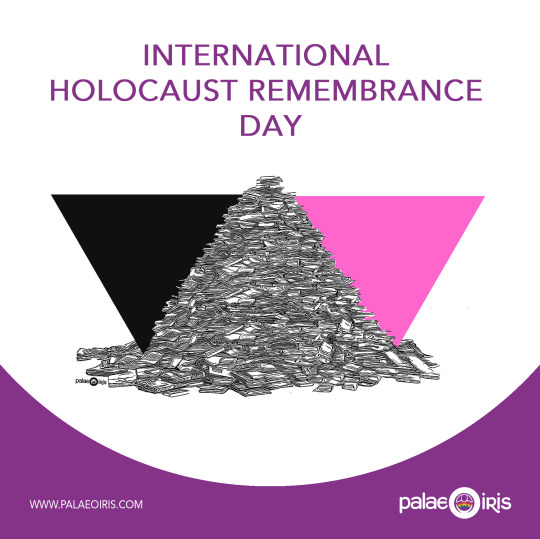



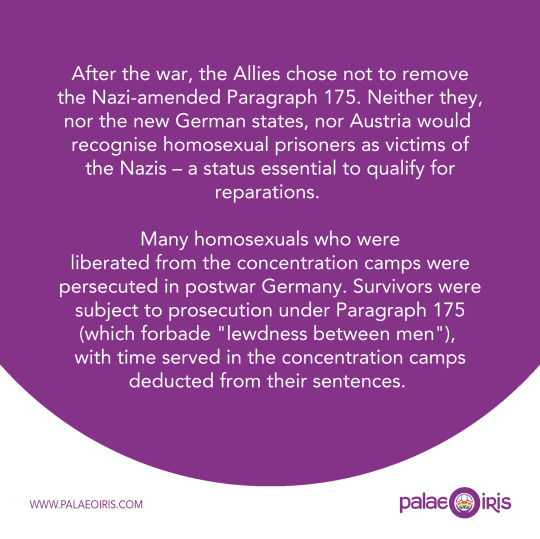
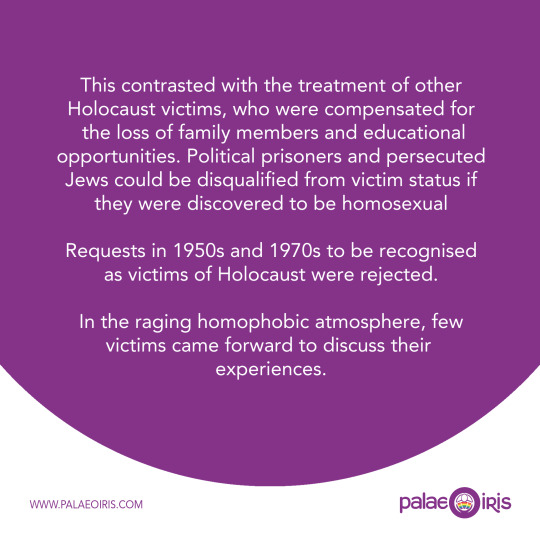

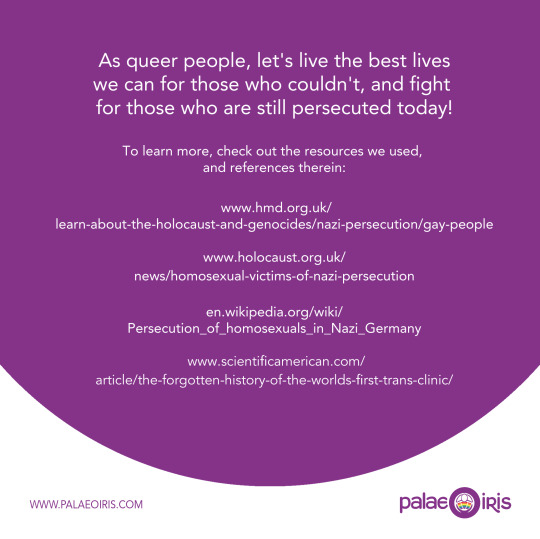
International Holocaust Remembrance Day commemorates the anniversary of the liberation of Auschwitz-Birkenau concentration camp by the Red Army in 1945. Today we remember millions of victims of the Nazi regime, including those that have often been missing when talking about the victims.
Gay men, lesbians and trans people were sent into concentration camps, marked by the pink or black triangles, tortured, kept in inhumane conditions, worked to death and exterminated, along with jewish people, romani, disabled people, socialists, communists, Slavs, and others.
On these slides we will quickly cover queer prosecution by Nazis, as well ways in which for them the discrimination didn't end with the Holocaust.
#HolocaustRemembrance#HolocaustRemembranceDay#queervictimsofHolocaust#queerholocaustmemory#queerholocausthistory#queerholocaustmemorial#pinktriangle#blacktriangle#Nazibookburnings#HirschfeldInstitute#HolocaustMemorialArt#HolocaustMemorialDayArt#queerholocaustart#originalartwork#Holocaust Remembrance Day#queer history#queer victims of Holocaust#Queer Holocaust Memory#Queer Holocaust history#Queer holocaust memorial#pink triangle#black triangle#Hirscfeld institute
42 notes
·
View notes
Text
This is an unfriendly reminder that exclusion of LGBTQ victims of the Holocaust is Holocaust denial.
#queer genocide under the Holocaust has only been recognised THIS century.#January 27#every. Fucking. year. on holocaust memorial day. EVERY YEAR.
108 notes
·
View notes
Text

Today is the holocaust Remembrance day, and the hate is still growing.
Never again!
#converting to judaism#judaism#queer jews#trans jews#jewish#Never Again#holocaust remembrance day#holocaust#antisemitism#jews needs to stick together#holocaust memorial day#Yom Hashoah
53 notes
·
View notes
Text
Today in "I wonder how Germany is doing":
It's Holocaust Memorial Day, and TERFs are using it to push their fascism:
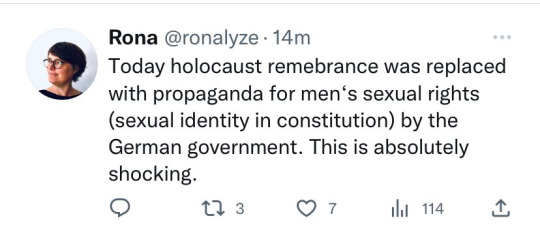
They are livid that FOR THE FIRST TIME, Germany mentions the queer victims of the Holocaust. Gays, lesbians, trans people, gender noncorming people, ALL of them. TERFs hate it.
So, the next time a TERF tries to tell you they care about "LGB" people, remember:
They don't.
Also, there are Nazis in the German parliament, even on this day, pretending to be sad.
5 notes
·
View notes
Text
We need mandatory 20th century history education NOW:
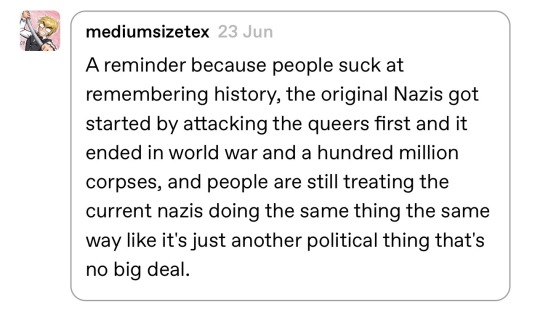
#one of the first things you learn about the rise of Nazi Germany#is that the first people targeted were political dissenters#not so-called ‘queers’#don’t trust your year 11 history teacher?#great news it’s spelled out for you at the literal concentration camp memorials#which I’ve been to#and it makes me so unspeakably angry to see trans people rewrite history to be included in the holocaust#so they can win more oppression points#and doing so under the label of ‘queer’#because they know they won’t be taken seriously#this was on a post about why trans didn’t need a medical diagnosis to receive gender affirming health care#they have to appropriate the pain of holocaust victims#so they can justify fucking breast implants on men#trans anti semitism
1 note
·
View note
Note
The hardest thing about all this was learning that the Holocaust is in fact a colonialist hoax cooked up by the Zionists to garner sympathy. And it worked on so many of us for so long. How do these people keep getting away with this??
Alright this isn’t no fucking gotcha moment, I feel sick. This is so disgustingly wrong and disturbing. The Holocaust HAPPENED. The scar it left on the Jewish people is something we are still grappling with and healing to this day. The hole it left in Europe still remains.
Holocaust denialism is so deeply antisemitic, it is facist, it is evil. Millions of Jews lost their lives due to white supremacist, Nazi ethnonationalism. Millions of Communists, Hungarians, Rroma, Poles, Black, Queer and disabled people violently lost their lives. This conspiracy theory is dangerous and damaging to progressive spaces, do not ever consider yourself a Leftist or even an anti-Zionist if you possess even an inch of Holocaust denialism.
The United States and State of Israel weaponise the Holocaust to justify crimes against Palestinians— no hoax, it is just that now, unfortunately, the memory of the Holocaust has been warped into a tool for empiric expansion and less of a lesson on the dangers of ethnonationalism, capitalism and white supremacy.
Fuck you, never speak on my people like that.
256 notes
·
View notes
Text
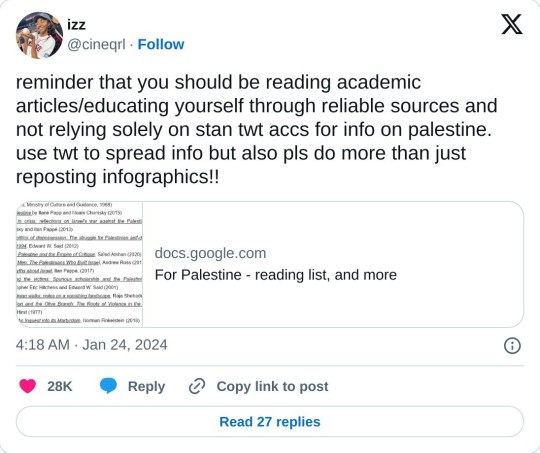
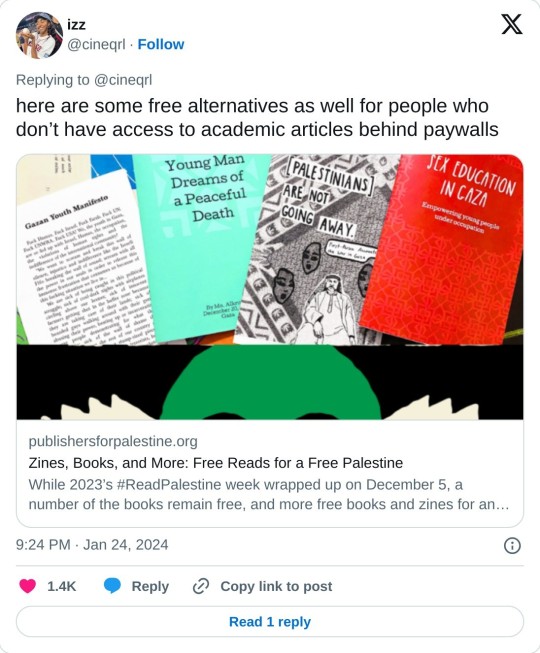
A copy of the first reading list, if you dislike clicking on Google docs links:
The liberal news media is working overtime to silence Palestinian voices. As we sit thousands of miles away, witnessing the massacre through social media, the least we can do is educate ourselves and work to educate others. Apartheid threatens all of us, and just to reiterate, anti-Zionism ≠ antisemitism.
Academic Works, Poetry and Memoirs
The Revolution of 1936-1939 in Palestine: Background, Details, and Analysis, Ghassan Kanafani (1972)
Palestinians: From Peasants to Revolutionaries, Rosemary Sayegh (1979)
Popular Resistance in Palestine: A History of Hope and Empowerment, Mazin Qumsiyeh (2011)
My Life in the PLO: The Inside Story of the Palestinian Struggle, Shafiq al-Hout and Jean Said Makdisi (2019)
My People Shall Live, Leila Khaled (1971)
Poetry of Resistance in Occupied Palestine, translated by Sulafa Hijjawi (Baghdad, Ministry of Culture and Guidance, 1968)
On Palestine by Ilan Pappé and Noam Chomsky (2015)
Gaza in Crisis: Reflections on the US-Israeli War Against the Palestinians, Noam Chomsky and Ilan Pappé (2013)
The Politics of Dispossession: The Struggle for Palestinian Self-Determination, 1969-1994, Edward W. Said (2012)
Queer Palestine and the Empire of Critique, Sa’ed Atshan (2020)
Stone Men: The Palestinians Who Built Israel, Andrew Ross (2019)
Ten Myths About Israel, Ilan Pappé (2017)
Blaming the Victims: Spurious Scholarship and the Palestinian Question, Christopher Eric Hitchens and Edward W. Said (2001)
Palestinian Walks: Notes on a Vanishing Landscape, Raja Shehadeh (2010)
The Gun and the Olive Branch: The Roots of Violence in the Middle East, David Hirst (1977)
Gaza: An Inquest into Its Martyrdom, Norman Finkelstein (2018)
Fateful Triangle: The United States, Israel and the Palestinians, Noam Chomsky (1983)
Israel and Palestine: Reappraisals, Revisions, Refutations, Avi Shlaim (2010)
Politicide: Ariel Sharon’s War Against the Palestinians, Baruch Kimmerling (2006)
The Holocaust Industry: Reflections on the Exploitation of Jewish Suffering, Norman G. Finkelstein (2015)
Light in Gaza: Writings Born of Fire, Jehad Abusalim (2022)
Nakba: Palestine, 1948, and the Claims of Memory, Ahmad H. Sa’di and Lila Abu-Lughod (2007)
Peace and its discontents: Essays on Palestine in the Middle East peace process, Edward W. Said (2012)
Three Poems by Yahya Hassan
Articles, Papers & Essays
“Palestinian history doesn’t start with the Nakba” by PYM (May, 2023)
“What the Uprising Means,” Salim Tamari (1988)
“The Palestinians’ inalienable right to resist,” Louis Allday (2021)
“Liberating a Palestinian Novel from Israeli Prison,” Danya Al-Saleh and Samar Al-Saleh (2023)
Women, War, and Peace: Reflections from the Intifada, Nahla Abdo (2002)
“A Place Without a Door” and “Uncle Give me a Cigarette”—Two Essays by Palestinian Political Prisoner, Walid Daqqah (2023)
“Live Like a Porcupine, Fight Like a Flea,” A Translation of an Article by Basel Al-Araj
Films & Video Essays
Fedayin: Georges Abdallah’s Fight (2021)
Naila and the Uprising (2017)
Off Frame AKA Revolution Until Victory (2015)
Tell Your Tale Little Bird (1993)
The Time That Remains (2009)
“The Present” (short film) (2020)
“How Palestinians were expelled from their homes”
Louis Theroux: The Ultra Zionists (2011)
Born in Gaza (2014)
5 Broken Cameras (2011)
Little Palestine: Diary of a Siege (2021)
Al-Nakba: The Palestinian catastrophe - Episode 1 | Featured Documentary
Organisations to donate to
Palestine Red Crescent Society - https://www.palestinercs.org/en
Anera - https://support.anera.org/a/palestine-emergency
Palestinian American Medical Association - https://palestinian-ama.networkforgood.com/projects/206145-gaza-medical-supplies-oct-2023
You First Gaza - https://donate.gazayoufirst.org/
MAP - Medical Aid for Palestinians - https://www.map.org.uk/donate/donate
United Nations Relief and Works Agency - https://donate.unrwa.org/-landing-page/en_EN
Palestine Children’s Relief Fund - https://www.pcrf.net/
Doctors Without Borders - https://www.doctorswithoutborders.org/what-we-do/where-we-work/palestine
AP Fact Check
https://apnews.com/article/israel-hamas-gaza-misinformation-fact-check-e58f9ab8696309305c3ea2bfb269258e
This list is not exhaustive in any way, and is a summary of various sources on the Internet. Please engage with more ethical, unbiased sources, including Decolonize Palestine and this list compiled by the Palestinian Youth Movement.
319 notes
·
View notes
Text
Happy Pride Month! If I see any of you goyishe fucks calling Anne Frank bi, or worse a 'bicon", I will egg your house.
She was a child who was murdered in the Holocaust before she could declare what her sexuality was. We don't know what she would have identified as.
Parts weren't edited out because her father Otto was being malicious, not only would parts that were left out only serve to distract from the message of her diary (as proven by y'all's obsession with these entries), queerness was also still very much illegal. He was protecting his daughter's memory and ensuring the diary focused on the story it desperately needed to tell at the time.
There are so many other historical figures who were openly queer that you can support instead of fuelling your weird obsession with dead Jews.
Let Anne Frank rest.
#jumblr#jewish#judaism#anne frank#lgbt#lgbt+#lgbtq#lgbtq+#lgbtqia#lgbtqia+#queer#pride#pride month#queer antisemitism
966 notes
·
View notes
Text
Today, on International Holocaust Memorial Day, the 79th anniversary of the liberation of Auschwitz, and in a time of a huge rise in antisemitic hatred and violence, I honour the lives and memories of the 6 million Jewish souls lost and I stand with the Jewish community, today and every day. Now more than ever, I vow to stand in solidarity and utterly reject the insidious bigotry that is baked into the very foundations of society.
NEVER AGAIN MEANS NEVER AGAIN.
I honour too the lives and memories of those other souls caught up in the monstrous evil of Nazism - the lives and humanity of Rroma and Sinti, of Slavs, of disabled and queer people, of political prisoners and prisoners of war - all those human beings seen as disposable steps in the obsessive pursuit of their ultimate poisonous ideology of Jewish eradication.
We must remain vigilant and fight against hatred and dehumanisation every day.

226 notes
·
View notes
Text
best books I read in 2023:
sophie strand, the flowering wand: rewilding the sacred masculine
alex iantaffi, gender trauma: healing cultural, social, and historical gendered trauma
matthew desmond, evicted: poverty and profit in the american city
betty dodson, sex for one: the joy of selfloving
ching-in chen, andrea smith, jai dulani, the revolution starts at home: confronting intimate partner violence within activist communities
robin stern, the gaslight effect: how to spot and survive the hidden manipulation others use to control your life
nick turse, kill anything that moves: the real american war in vietnam
lori fox, this has always been a war: the radicalization of a working class queer
arline t. geronimus, weathering: the extraordinary stress of ordinary life in an unjust society
roxanne dunbar-ortiz, not a nation of immigrants: settler colonialism, white supremacy, and a history of erasure and exclusion
eyal press, dirty work: essential jobs and the hidden toll of inequality in america
rabbi danya ruttenberg, on repentence and repair: making amends in an unapologetic world
michelle dowd, forager: field notes for surviving a family cult
starhawk, the empowerment manual: a guide for collaborative groups
betty dodson, orgasms for two: the joy of partnersex
timothy snyder, black earth: the holocaust as history and warning
kidada e. williams, I saw death coming: a history of terror and survival in the war against reconstruction
judy grahn, another mother tongue: gay words, gay worlds
jennifer m. silva, coming up short: working-class adulthood in an age of uncertainty
susanna clarke, piranesi
megan asaka, seattle from the margins: exclusion, erasure, and the making of a pacific coast city
starhawk, truth or dare: encounters with power, authority, and mystery
laura jane grace, tranny: confessions of punk rock’s most infamous anarchist sellout
molly smith, revolting prostitutes: the fight for sex worker's rights
richard c. schwartz, you are the one you've been waiting for: applying internal family systems to intimate relationships
timothy snyder, our malady: lessons in liberty from a hospital diary
peter levine, trauma and memory: brain and body in search for the living past
kylie cheung, survivor injustice: state-sanctioned abuse, domestic violence, and the fight for bodily autonomy
timothy snyder, bloodlands: europe between hitler and stalin
joan larkin, a woman like that: lesbian and bisexual writers tell their coming out stories
cj cherryh, hammerfall
256 notes
·
View notes
Text
Denazification, truth and reconciliation, and the story of Germany's story
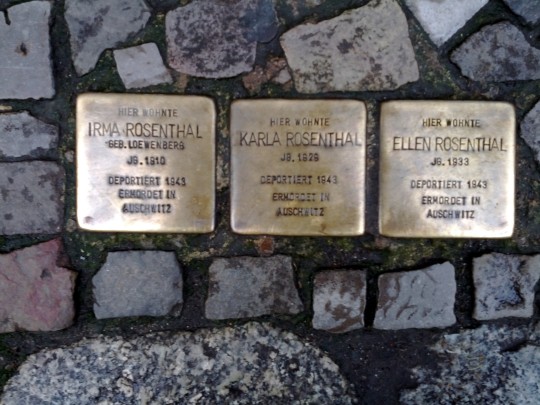
Germany is the “world champion in remembrance,” celebrated for its post-Holocaust policies of ensuring that every German never forgot what had been done in their names, and in holding themselves and future generations accountable for the Nazis’ crimes.
All my life, the Germans have been a counterexample to other nations, where the order of the day was to officially forget the sins that stained the land. “Least said, soonest mended,” was the Canadian and American approach to the genocide of First Nations people and the theft of their land. It was, famously, how America, especially the American south, dealt with the legacy of slavery and Jim Crow.
Silence begets forgetting, which begets revisionism. The founding crimes of our nations receded into the mists of time and acquired a gauzy, romantic veneer. Plantations — slave labor camps where work was obtained through torture, maiming and murder — were recast as the tragiromantic settings of Gone With the Wind. The deliberate extinction of indigenous peoples was revised as the “taming of the New World.” The American Civil War was retold as “The Lost Cause,” fought over states’ rights, not over the right of the ultra-wealthy to terrorize kidnapped Africans and their descendants into working to death.
This wasn’t how they did it in Germany. Nazi symbols and historical revisionism were banned (even the Berlin production of “The Producers” had to be performed without swastikas). The criminals were tried and executed. Every student learned what had been done. Cash reparations were paid — to Jews, and to the people whom the Nazis had conquered and brutalized. Having given in to ghastly barbarism on an terrifyingly industrial scale, the Germans had remade themselves with characteristic efficiency, rooting out the fascist rot and ensuring that it never took hold again.
But Germany’s storied reformation was always oversold. As neo-Nazi movements sprang up and organized political parties — like the far-right Alternative für Deutschland — fielded fascist candidates, they also took to the streets in violent mobs. Worse, top German security officials turned out to be allied with AfD:
https://www.wsws.org/en/articles/2018/08/04/germ-a04.html
Neofascists in Germany had fat bankrolls, thanks to generous, secret donations from some of the country’s wealthiest billionaires:
https://www.spiegel.de/international/germany/billionaire-backing-may-have-helped-launch-afd-a-1241029.html
And they broadened their reach by marrying their existing conspiratorial beliefs with Qanon, which made their numbers surge:
https://www.thedailybeast.com/how-fringe-groups-are-using-qanon-to-amplify-their-wild-messages
Today, the far right is surging around Europe, with the rot spreading from Hungary and Poland to Italy and France. In an interview with Jacobin’s David Broder, Tommaso Speccher a researcher based in Berlin, explores the failure of Germany’s storied memory:
https://jacobin.com/2023/07/germany-nazism-holocaust-federal-republic-memory-culture/
Speccher is at pains to remind us that Germany’s truth and reconciliation proceeded in fits and starts, and involved compromises that were seldom discussed, even though they left some of the Reich’s most vicious criminals untouched by any accountability for their crimes, and denied some victims any justice — or even an apology.
You may know that many queer people who were sent to Nazi concentration camps were immediately re-imprisoned after the camps were liberated. Both Nazi Germany and post-Nazi Germany made homosexuality a crime:
https://time.com/5953047/lgbtq-holocaust-stories/
But while there’s been some recent historical grappling with this jaw-dropping injustice, there’s been far less attention given to the plight of the communists, labor organizers, social democrats and other leftists whom the Nazis imprisoned and murdered. These political prisoners (and their survivors) struggled mightily to get the reparations they were due.
Not only was the process punitively complex, but it was administered by bureaucrats who had served in the Reich — the people who had sent them to the camps were in charge of deciding whether they were due compensation.
This is part of a wider pattern. The business-leaders who abetted the Reich through their firms — Siemens, BMW, Hugo Boss, IG Farben, Volkswagon — were largely spared any punishment for their role in the the Holocaust. Many got to keep the riches they acquired through their part on an act of genocide.
Meanwhile, historians grappling with the war through the “Historikerstreit” drew invidious comparisons between communism and fascism, equating the two ideologies and tacitly excusing the torture and killing of political prisoners (this tale is still told today — in America! My kid’s AP history course made this exact point last year).
The refusal to consider that extreme wealth, inequality, and the lust for profits — not blood — provided the Nazis with the budget, materiel and backing they needed to seize control in Germany is of a piece with the decision not to hold Germany’s Nazi-enabling plutocrats to account.
The impunity for business leaders who collaborated with the Nazis on exploiting slave labor is hard to believe. Take IG Farben, a company still doing a merry business today. Farben ran a rubber factory on Auschwitz slave labor, but its executives were frustrated by the delays occasioned by the daily 4.5m forced march from the death-camp to its factory:
https://pluralistic.net/2023/06/02/plunderers/#farben
So Farben built Monowitz, its own, private-sector concentration camp. IG Farben purchased 25,000 slaves from the Reich, among them as many children as possible (the Reich charged less for child slaves).
Even by the standards of Nazi death camps, Monowitz was a charnel house. Monowitz’s inmates were worked to death in just three months. The conditions were so brutal that the SS guards sent official complaints to Berlin. Among their complaints: Farben refused to fund extra hospital beds for the slaves who were beaten so badly they required immediate medical attention.
Farben broke the historical orthodoxy about slavery: until Monowitz, historians widely believed that enslavers would — at the very least — seek to maintain the health of their slaves, simply as a matter of economic efficiency. But the Reich’s rock-bottom rates for fresh slaves liberated Farben from the need to preserve their slaves’ ability to work. Instead, the slaves of Monowitz became disposable, and the bloodless logic of profit maximization dictated that more work could be attained at lower prices by working them to death over twelve short weeks.
Few of us know about Monowitz today, but in the last years of the war, it shocked the world. Joseph Borkin — a US antitrust lawyer who was sent to Germany after the war as part of the legal team overseeing the denazification program — wrote a seminal history of IG Farben, “The Crime and Punishment of I.G. Farben”:
https://www.scribd.com/document/517797736/The-Crime-and-Punishment-of-I-G-Farben
Borkin’s book was a bestseller, which enraged America’s business lobby. The book made the connection between Farben’s commercial strategies and the rise of the Reich (Farben helped manipulate global commodity prices in the runup to the war, which let the Reich fund its war preparations). He argued that big business constituted a danger to democracy and human rights, because its leaders would always sideline both in service to profits.
US companies like Standard Oil and Dow Chemicals poured resources into discrediting the book and smearing Borkin, forcing him into retirement and obscurity in 1945, the same year his publisher withdrew his book from stores.
When we speak of Germany’s denazification effort, it’s as a German program, but of course that’s not right. Denazification was initiated, designed and overseen by the war’s winners — in West Germany, that was the USA.
Those US prosecutors and bureaucrats wanted justice, but not too much of it. For them, denazification had to be balanced against anticommunism, and the imperatives of American business. Nazi war criminals must go on trial — but not if they were rocket scientists, especially not if the USSR might make use of them:
https://en.wikipedia.org/wiki/Wernher_von_Braun
Recall that in the USA, the bizarre epithet “premature antifascist” was used to condemn Americans who opposed Nazism (and fascism elsewhere in Europe) too soon, because these antifascists opposed the authoritarian politics of big business in America, too:
https://www.thenation.com/article/archive/premature-antifascist-and-proudly-so/
When 24 Farben executives were tried at Nuremberg for the slaughter at Monowitz, then argued that they had no choice but to pursue slave labor — it was their duty to their shareholders. The judges agreed: 19 of those executives walked.
Anticommunism hamstrung denazification. There was no question that German elites and its largest businesses were complicit in Nazi crimes — not mere suppliers, but active collaborators. Antifacism wasn’t formally integrated into the denazification framework until the 1980s with “constitutional patriotism,” which took until the 1990s to take firm root.
The requirement for a denazification program that didn’t condemn capitalism meant that there would always be holes in Germany’s truth and reconciliation process. The newly formed Federal Republic set aside Article 10 of the Nuremberg Charter, which would hold all members of the Nazi Party and SS responsible for their crimes. But Article 10 didn’t survive contact with the Federal Republic: immediately upon taking office, Konrad Adenauer suspended Article 10, sparing 10 million war criminals.
While those spared included many rank-and-file order-followers, it also included many of the Reich’s most notorious criminals. The Nazi judge who sent Erika von Brockdorff to her death for her leftist politics was given a judge’s pension after the war, and lived out his days in a luxurious mansion.
Not every Nazi was pensioned off — many continued to serve in the post-war West German government. Even as Willy Brandt was demonstrating historic remorse for Germany’s crimes, his foreign ministry was riddled with ex-Nazi bureaucrats who’d served in Hitler’s foreign ministry. We still remember Brandt’s brilliant 1973 UN speech on the Holocaust:
https://www.willy-brandt-biography.com/historical-sources/videos/speech-uno-new-york-1973/
But recollections of Brandt’s speech are seldom accompanied by historian Götz Aly’s observation that Brandt couldn’t have given that speech in Germany without serious blowback from the country’s still numerous and emboldened antisemites (Brandt donated his Nobel prize money to restore Venice’s Scuola Grande Tedesca synagogue, but ensured that this was kept secret until after his death).
All this to say that Germany’s reputation as “world champions of memory” is based on acts undertaken decades after the war. Some of Germany’s best-known Holocaust memorials are very recent, like the Wannsee Conference House (1992), the Memorial to the Murdered Jews of Europe (2005), and the Topography of Terror Museum in (2010).
Germany’s remembering includes an explicit act of forgetting — forgetting the role Germany’s business leaders and elites played in Hitler’s rise to power and the Nazi crimes that followed. For Speccher, the rise of neofacist movements in Germany can’t be separated from this selective memory, weighed down by anticommunist fervor.
And in East Germany, there was a different kind of incomplete rememberance. While the DDR’s historians and teachings emphasized the role of business in the rise of fascism, they excluded all the elements of Nazism rooted in bigotry: antisemitism, homophobia, sectarianism, and racism. For East German historians, Nazism wasn’t about these, it was solely “the ultimate end point of the history of capitalism.”
Neither is sufficient to prevent authoritarianism and repression, obviously. But the DDR is dust, and the anticommunism-tainted version of denazification is triumphant. Today, Europe’s wealthiest families and largest businesses are funneling vast sums into far-right “populist” parties that trade in antisemitic “Great Replacement” tropes and Holocaust denial:
https://corporateeurope.org/sites/default/files/2019-05/Europe%E2%80%99s%20two-faced%20authoritarian%20right%20FINAL_1.pdf
And Germany’s coddled aristocratic families and their wealthy benefactors — whose Nazi ties were quietly forgiven after the war — conspire to overthrow the government and install a far-right autocracy:
https://www.reuters.com/world/europe/25-suspected-members-german-far-right-group-arrested-raids-prosecutors-office-2022-12-07/
In recent years, I’ve spent a lot of time thinking about denazification. For all the flaws in Germany’s remembrance, it stands apart as one of the brightest lights in national reckonings with unforgivable crimes. Compare this with, say, Spain, where the remains of fascist dictator Francisco Franco were housed in a hero’s monument, amidst his victims’ bones, until 2019:
https://en.wikipedia.org/wiki/Pedro_S%C3%A1nchez#Domestic_policy
What do you do with the losers of a just war? “Least said soonest mended” was never a plausible answer, and has been a historical failure — as the fields of fluttering Confederate flags across the American south can attest (to say nothing of the failure of American de-ba’athification in Iraq):
https://en.wikipedia.org/wiki/De-Ba%27athification
But on the other hand, people who lose the war aren’t going to dig a hole, climb in and pull the dirt down on top of themselves. Just because I think Germany’s denazification was hobbled by the decision to lets its architects and perpetrators walk free, I don’t know that I would have supported prison for all ten million people captured by Article 10.
And it’s not clear that an explicit antifascism from the start would have patched the holes in German denazification. As Speccher points out, Italy’s postwar constitution was explicitly antifascist, the nation “steeped in institutional anti-fascism.” Postwar Italian governments included prominent resistance fighters who’d fought Mussolini and his brownshirts.
But in the 1990s, “the end of the First Republic” saw constitutional reforms that removed antifascism — reforms that preceded the rise of the corrupt authoritarian Silvio Berlusconi — and there’s a line from him to the neofascists in today’s ruling Italian coalition.
Is there any hope for creating a durable, democratic, anti-authoritarian state out of a world run by the descendants of plunderers and killers? Can any revolution — political, military or technological — hope to reckon with (let alone make peace with!) the people who have brought us to this terrifying juncture?
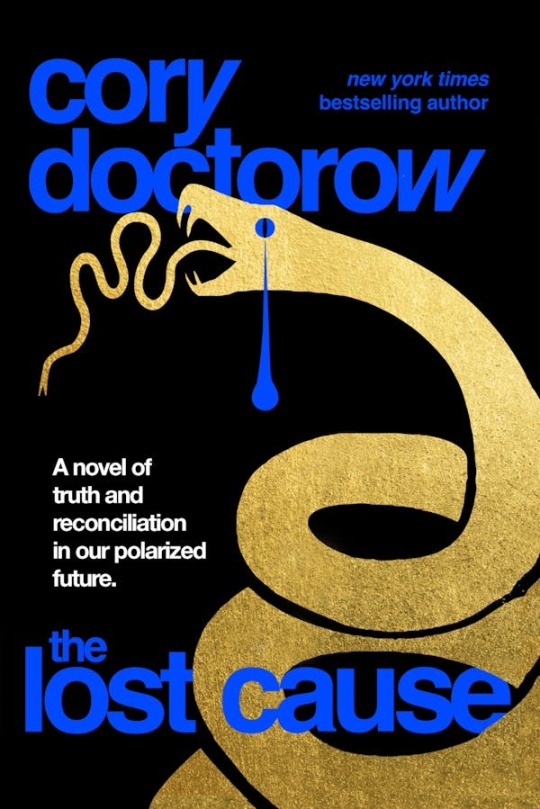
[Image ID: The Tor Books cover for ‘The Lost Cause,’ designed by Will Staehle, featuring the head of the snake on the Gadsen ‘Don’t Tread on Me’ flag, shedding a tear.]
Like I say, this is something I’ve spent a lot of time thinking about — not just how we might get out of this current mess, but how we’ll stay out of it. As is my wont, I’ve worked out my anxieties on the page. My next novel, The Lost Cause, comes out from Tor Books and Head of Zeus in November:
https://us.macmillan.com/books/9781250865939/the-lost-cause
Lost Cause is a post-GND utopian novel about a near-future world where the climate emergency is finally being treated with the seriousness and urgency it warrants. It’s a world wracked by fire, flood, scorching heat, mass extinctions and rolling refugee crises — but it’s also a world where we’re doing something about all this. It’s not an optimistic book, but it is a hopeful one. As Kim Stanley Robison says:
This book looks like our future and feels like our present — it’s an unforgettable vision of what could be. Even a partly good future will require wicked political battles and steadfast solidarity among those fighting for a better world, and here I lived it along with Brooks, Ana Lucía, Phuong, and their comrades in the struggle. Along with the rush of adrenaline I felt a solid surge of hope. May it go like this.
The Lost Cause is a hopeful book, but it’s also a worried one. The book is set during a counter-reformation, where an unholy alliance of seagoing anarcho-capitalist wreckers and white nationalist militias are trying to seize power, snatching defeat from the jaws of the fragile climate victory. It’s a book about the need for truth and reconciliation — and its limits.
As Bill McKibben says:
The first great YIMBY novel, this chronicle of mutual aid is politically perceptive, scientifically sound, and extraordinarily hopeful even amidst the smoke. Forget the Silicon Valley bros — these are the California techsters we need rebuilding our world, one solar panel and prefab insulated wall at a time.
We’re currently in the midst of a decidedly unjust war — the war to continue roasting the planet, a war waged in the name of continuing enrichment of the world’s already-obscenely-rich oligarchs. That war requires increasingly authoritarian measures, increasing violence and repression.
I believe we can win this war and secure a habitable planet for all of us — hell, I believe we can build a world of comfort and abundance out of its ashes, far better than this one:
https://tinyletter.com/metafoundry/letters/metafoundry-75-resilience-abundance-decentralization
But even if that world comes to being, there will be millions of people who hate it, a counter-revolution in waiting. These are our friends, our relatives, our neighbors. Figuring out how to make peace with them — and how to hold their most culpable, most powerful leaders to account — is a project that’s as important, and gigantic, and uncertain, as a just transition is.

Next weekend, I’ll be at San Diego Comic-Con:
Thu, Jul 20 16h: Signing, Tor Books booth #2802 (free advance copies of The Lost Cause— Nov 2023 — to the first 50 people!)
Fri, Jul 21 1030h: Wish They All Could be CA MCs, room 24ABC (panel)
Fri, Jul 21 12h: Signing, AA09
Sat, Jul 22 15h: The Worlds We Return To, room 23ABC (panel)

If you'd like an essay-formatted version of this thread to read or share, here's a link to it on pluralistic.net, my surveillance-free, ad-free, tracker-free blog:
https://pluralistic.net/2023/07/19/stolpersteine/#truth-and-reconciliation

[Image ID: Three 'stumbling stones' ('stolpersteine') set into the sidewalk in the Mitte, in Berlin; they memorialize Jews who lived nearby until they were deported to Auschwitz and murdered.]
#pluralistic#stolpersteine#historians' dispute#Historikerstreit#nazis#godwin's law#mussolini#berlusconi#italy#antifa#fascism#history#truth and reconciliation#the lost cause#denazification
246 notes
·
View notes
Text
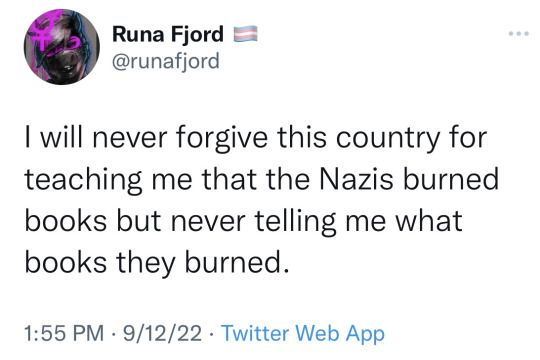
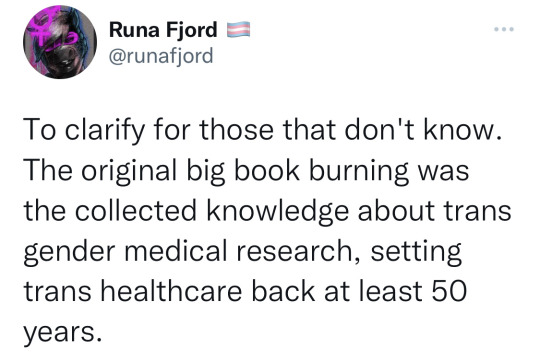
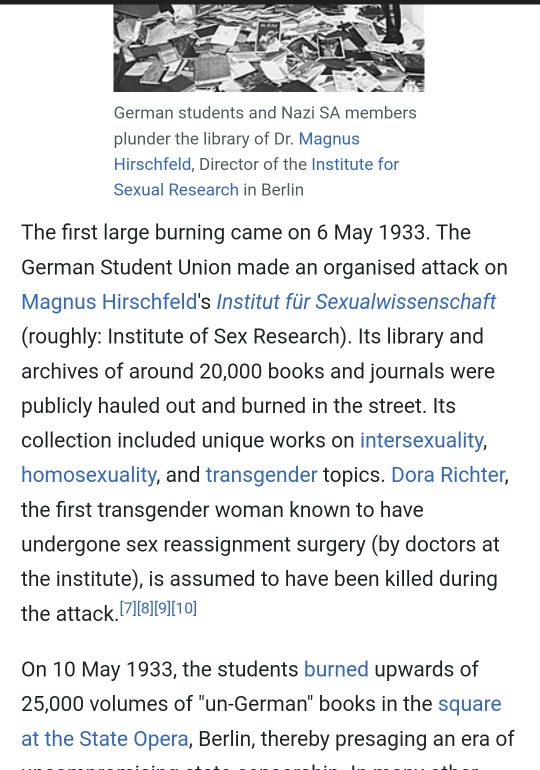
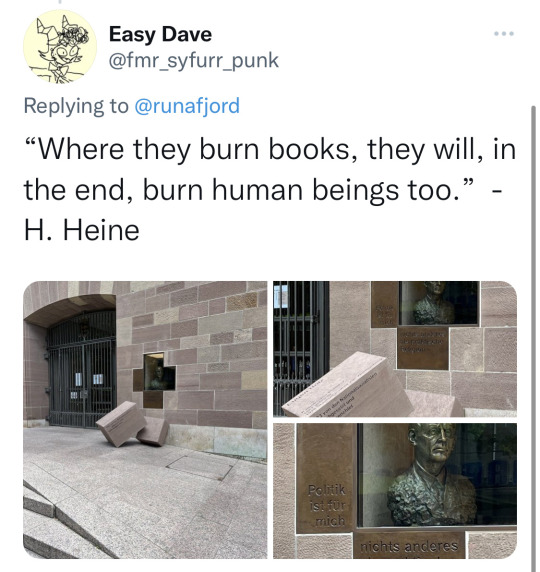
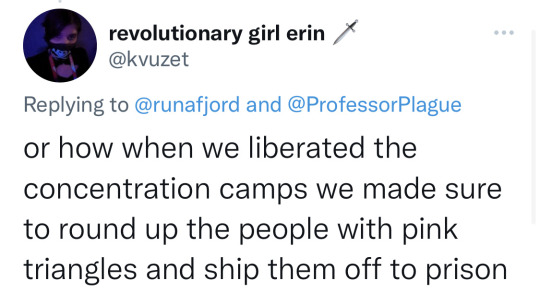
Berlin had become the “gay capital of the world,” a city with a booming queer nightlife scene and the center of new academic ideas calling for greater acceptance of homosexuality and gender non-conformity.
To the Nazis, homosexuality represented a “threat” to the “Aryan” race’s survival that needed to be stamped out. Although male homosexual activity had been technically illegal in Germany since the 19th century, it was generally tolerated and even celebrated prior to Adolf Hitler’s ascension to power in 1933.
The Nazis began their anti-queer purges by targeting clubs, societies and Magnus Hirschfield’s renowned sexology research institute, burning the books in its library. Decades of pioneering work and community life had been erased.
By 1935, Paragraph 175 of the German penal code was revised to include a harsher sentence and criminalize virtually any kind of male same-sex intimacy.
Between 1933 and 1945, an estimated 100,000 men were arrested for violating Nazi Germany’s law against homosexuality, and of these, approximately 50,000 were sentenced to prison. An estimated 5,000 to 15,000 men were sent to concentration camps on similar charges.
In the concentration camps, they were subjected to barbaric tortures, including sexual abuse, castration and medical experiments. The other prisoners also ostracized them. Overall prospects for gay prisoners were poor: an estimated 65% died, and an unknown, albeit likely disproportionate number committed suicide.
As the Allies swept through Europe to victory over the Nazi regime in early 1945, hundreds of thousands of concentration camp prisoners were liberated. The Allied Military Government of Germany repealed countless laws and decrees, but left unchanged the 1935 Nazi revision of Paragraph 175.
For the queer survivors of Nazi oppression, 1945 did not bring about any kind of liberation; rather, it marked the beginning of a systematic process of persecution and willful suppression—one that would result in their erasure from the pages of popular history.
Under the Allied occupation, homosexual concentration camp survivors were forced to serve out their terms of imprisonment regardless of time served in the concentration camps. They were easy to identify because in the concentration camps they had an upside-down pink triangle sewn to their clothes.
After the war, Jews, children, and political prisoners could apply for financial and moral support from the new German governments (a.k.a. reparations), homosexual men could not. Similarly, gay survivors were not allowed to collect a pension for the time they spent working in the concentration camps while other survivors could.
The Nazi version of Paragraph 175 remained on the books of the Federal Republic of Germany (West Germany) until the law was revised in 1969 to decriminalize homosexual relations between men over the age of 21. This resulted in the arrest of around 100,000 gay men between 1945 and 1969. Paragraph 175 itself would only be entirely removed from the penal code in 1994, following Germany’s reunification.
Advocacy groups successfully rallied for the creation of memorials, and the German Bundestag finally voted to pardon and compensate the victims of Paragraph 175 in 2017, a meager and all-too-late offer of justice as most of the victims were long dead.
The Nazi-era oppression of queer women and intersex individuals has been overshadowed due to a combination of homophobia and sexism. Lesbian women, for instance, may not have been systematically persecuted under the Third Reich, as Paragraph 175 only targeted gay men, but that did not deter the Nazis from shutting down their clubs or arresting them for “anti-sociality,” deeming them “morally unsound,” labeling them as “lesbisch” (lesbian) political dissidents and sending them to concentration camps.
For years, LGBTQ organizations were ignored and even shunned from Holocaust commemorations. The gathering of their stories was not considered important. The suppression of the Holocaust’s queer voices remains a stain that lingers on to this day.
#queer history#scary how fast things changed#from gay capital of world to concentration camps#never forget#long post
707 notes
·
View notes
Text
Wanna learn about women history and WWII? Here is a non-exhaustive list to get you started
German women and the Nazi regime
Mothers in the Fatherland: Women, the Family and Nazi Politics, Claudia Koonz
Female SS Guards and Workaday Violence: The Majdanek Concentration Camp, 1942-1944, Elissa Mailänder
Zwangssterilisation im Nationalsozialismus: Studien zur Rassenpolitik und Frauenpolitik, Gisela Bock
Hitler's Furies: German Women in the Nazi Killing Fields, Wendy Lower
"Backlash against Prostitutes' Rights: Origins and Dynamics of Nazi Prostitution Policies," in Journal of the History of Sexuality Julia Roos
"German Women and the Holocaust in the Nazi East," Wendy Lower, in Women and Genocide, Elissa Bemporad & Joyce W. Warren
Frausein im Dritten Reich, Rita Thalmann
Women as victims or perpetrators of the Holocaust (general)
"Women and the Holocaust: A Reconsideration of Research," in Signs, Joan Ringelheim
Women in the Holocaust, Dalia Ofer & Lenore J. Weitzman
Das KZ-Bordell: Sexuelle Zwangsarbeit in nationalsozialistischen Konzentrationslagern, Robert Sommer
SS-Bordelle und Oral History. Problematische Quellen und die Existenz von Bordellen für die SS in Konzentrationslagern, Christa Paul & Robert Sommer
Sexual Violence during the Holocaust—The Case of Forced Prostitution in the Warsaw Ghetto, in Shofar: An Interdisciplinary Journal of Jewish Studies, Katarzyna Person
"Gender: A Crucial Tool in Holocaust Research," Marion Kaplan, in Women and Genocide, Elissa Bemporad & Joyce W. Warren
Different Voices: Women and the Holocaust, Carol Rittner & John K. Roth
Resilience and Courage: Women, Men, and the Holocaust, Nechema Tec
« Reframing Sexual Violence as a Weapon and Strategy of War: The Case of the German Wehrmacht during the War and Genocide in the Soviet Union, 1941–1944 », in Journal of the History of Sexuality, Regina Mühlhäuser
Sex and the Nazi soldier. Violent, commercial and consensual encounters during the war in the Soviet Union, 1941-45, Regina Mülhäuser
Romani women during the Holocaust
« Krieg im Frieden im Krieg: Reading the Romani Holocaust in terms of race, gender and colonialism », Eve Rosenhaft
« Hidden Lives : Sinti and Roma Women », Sybil Milton
« Romani women and the Holocaust Testimonies of Sexual Violence in Transnistria », Michelle Kelso
"No Shelter to Cry In: Romani Girls and Responsibility during the Holocaust," Michelle Kelso, in Women and Genocide, Elissa Bemporad & Joyce W. Warren
Jewish women during the Holocaust
Jewish women's sexual behaviour and sexualized abuse during the Nazi era, in The Canadian Journal of Human Sexuality, Beverley Chalmers
Sexual Violence against Jewish Women During the Holocaust, Sonja M. Hedgepeth & Rochelle G. Saidel
Persecution of lesbians by the Nazis
Days of Masquerade: Life Stories of Lesbians during the Third Reich, Claudia Schoppmann
Nationalsozialistische Sexualpolitik und weibliche Homosexualität, Claudia Schoppmann
“This Kind of Love”: Descriptions of Lesbian Behaviour in Nazi Concentration Camps, from Nationalsozialistische Sexualpolitik und weibliche Homosexualität, Claudia Schoppmann
Queer in Europe during the Second World War, Regis Schlagdenhauffen
Ravensbrück
Ravensbrück. Everyday Life in a Woman’s Concentration Camp 1939-45, Jack G. Morrison
Ravensbruck: Life and Death in Hitler's Concentration Camp for Women, Sarah Helm
Women and the Memory of WWII
Women, Genocide, and Memory: The Ethics of Feminist Ethnography in Holocaust Research, in Gender & Society, Janet Jacobs
Lessons Learned from Gentle Heroism: Women's Holocaust Narratives, in The Annals of the American Academy of Political and Social Science, Myrna Goldenberg
« An Austrian Roma Family Remembers: Trauma and Gender in Autobiographies by Ceija, Karl, and Mongo Stojka », Lorely French
Beyond Survival: Navigating Women's Personal Narratives of Sexual Violence in the Holocaust, Roy Schwartzman
Comfort Women and imperial Japan
Comfort Women: Sexual Slavery in the Japanese Military During World War II, Yoshimi Yoshiaki
The Comfort Women: Japan’s Brutal Regime of Enforced Prostitution in the Second World War, George Hicks
The Japanese Comfort Women and Sexual Slavery During the China and Pacific Wars, Caroline Norma
Lola's House: Filipino Women Living With War, Evelina Galang
Soviet Women during WWII
« “Girls” and “Women”. Love, Sex, Duty and Sexual Harassment in the Ranks of the Red Army 1941-1945 », in The Journal of Power Institutions in Post-Soviet Societies, Brandon M. Schechter
Soviet Women on the Frontline in the Second World War, Roger D. Markwick & Euridice Charon Cardona
Soviet Women in Combat. A History of Violence on the Eastern Front, Anna Krylova
#^ i know way more about the holocaust and women than other topics and that's why there are barely any books on women soldiers (except for#german women soldiers - duh - and soviet women (that's bc they were assigned readings))#and i included stuff in german because those books haven't been translated in english but i still think my german speaking mutuals would be#interested in them#holocaust#wwii#herstory
86 notes
·
View notes
Note
Stop spreading neocon fascist femcel rhetoric. The wisdom of repugnance is fascist ideology popularized by terfs using faux progressive language to remove queer art from the internet.
Criticize the things you dislike without becoming a nazi.
:]
I'm spreading anti-semitsim how anon??? If you're referring to helluva/hazbin then boy howdy do I have some ROUGH news for you :/
Also vivziepop took the femcel nearly terf-like behavior as well do you SEE How she writes her female and trans characters it's not a good look.....🤔
This is why the fandom can never take or handle criticism while queer people are coming from a genuine place all they want to do is scream over how 'wrong you are since you don't get it', read a book bro you're quick to insult over insight. I've actually met some holocaust survivors and frequently visit the memorial museum within my state to pay respect. Do your research babe<3
#anti vivziepop#anti brandon rogers#helluva boss critical#please stop supporting spindlehorse#i think ur projecting just a teensy wincy bit love<3#vivziepop critical#trash askbox#hazbin hotel critical#anti helluva boss#please stop supporting vivziepop#spindlehorse critical#fucked up#im repugnant at the fact that viv is getting away with current day abuse over and over again#v1v whiteknighting at its finest♡#[me in my corner vibing to criticize the media i dislike to make others aware-[#[anon bursting through my door to scream 'YOU FUCKING N@ZZI!' before throwing a sandal at me and crying to run away[#lol whatever
58 notes
·
View notes
Text
“Kids are too young to learn about that stuff/ it might make them feel bad!”
My earliest memory is being told by a cop that “your kind aren’t welcome here” when my mom tried to take us to a playground. I was seven when someone called me a kike for the first time. The boy I had a crush on found out, told me he would never think a “Jew-pig” was cute, and then told me that as a “good German” he was going to put me in an oven “where you belong”. I spent all of middle and high school with kids throwing Nazi salutes at me, flicking pennies at me, drawing swastikas on my desk. When people started a rumor that I was blowing random guys in the theater, I was specifically called “Jewish whore”.
If I can deal with all of this from the age of FUCKING FOUR without it letting up for a single fucking week. If black kids can experience being called slurs, assaulted, being afraid for their lives because they know what cops do to them. If disabled kids can spend their days being called crip, spaz, being excluded from the most basic of things because no one, their peers and adults alike, cares to accommodate them. If queer kids can handle being assaulted and mocked every day, being excluded from activities because of their gender.
Then your fucking kid can handle sitting in class for a lesson or two. Learning about all of the shit that’s been done to us in a way that is so watered down, it doesn’t even begin to cover it. Your kid can spend a day sitting in the auditorium watching “Schindler’s List” and giggling like a little fuck and imitating the Nazi salute while I sit there with the only other Jews in my grade and cry because we know this story and we have for years. Your kids can handle history lessons where they’re told that they could be Schindler. While I and kids like me know that we’re the little girl in the red jacket. Only meaningful for our shock value and pity when we die and nothing more. Only useful as a rhetorical device to inspire sympathy and tell other kids that they CAN do good, all while ignoring the fact that marginalized kids are fucking tortured at school by other kids, their teachers, and the fucking administration.
If you can’t handle your precious little baby having to learn about the Holocaust, or slavery, or racism, or the maltreatment of disabled people, or the AIDs crisis, for one day in an easy-to-swallow teaspoon of only slightly bitter medicine. Imagine being one of us.
#im pissed tonight#saw some shit about critical race theory#watched the John Oliver bit again#which is awesome by the way love him#but im just#oh my kid is too young to learn it at that age-#bitch if i and other kids like me#marginalized kids#can fucking LIVE IT from infancy#then your kid can sit and learn about it for a couple of hours#racism#abelism#antisemitism#queerphobia#slur mention
714 notes
·
View notes
Text
I’ve been seeing a lot of terfs deny the very clear link between trans exclusionism and nvzism/white supremacy simply because they do not understand the history behind it. ignorance is not a legitimate excuse to perpetuate systems of white supremacy. And it is further testament to the harm that banning critical race theory and queer studies in schools is doing to y’all’s brains. Because if I’m being completely honest, I’m seeing an alarming amount of self-identified terfs and radfems who are legit STILL IN HIGH SCHOOL. YOU ARE NOT WELCOME HERE. My blog is 18+, not for children, anyone under 18 gets immediately blocked. Anyway…
Transphobia and anti-blackness are historically linked and continue, to this day, to be overlapping forms of systemic oppression. Black trans women, specifically, have higher murder rates than any other group. Both trans and black people statistically face more medical discrimination than cis and white people, respectively. The combination of both of these marginalized identities forms a particular and very sinister intersection of oppression.
Not only do both of these systems of privilege work to uphold the social and structural power of cis people and white people.. biological essentialism and transphobia also, historically, were used to define the beliefs of white supremacy and race essentialism. Race essentialism is the false belief that it is “natural order” for whites to oppress other races. For centuries, white “philosophers” made up a whole list of pseudoscientific “reasons” WHY they believed racism was “natural”. One of them was the idea that “distinct and separate biological sexes were the mark of a more evolved race-“ meaning the white race.. they compared European patriarchal sex roles and gender roles to the matriarchal cultures and gender variance that they observed in communities of color.
I have seen terfs accuse people who bring up this historical fact of “masculinizing” black women and women of color, which is a very real issue, but in this case and with historical context, that is a misunderstanding and most of the time is being said by people who want to silence trans people and shut down any criticism of terfism.
Acknowledging the thousands of years of acceptance of gender variance and third/fourth gender categories within pre-colonial African, Indigenous, Latin, Asian, & Middle eastern cultures, is not to blame for the masculinization of women of color, and as a matter of fact: the invention and enforcement of Eurocentric gender roles REQUIRES and RELIES on the masculinization of women of color in order to uphold white women’s place within white supremist systems as the “ideal of femininity” that they can then weaponize against women of color when they do not adhere to those Eurocentric standards.
During times of enslavement and segregation, black women were forced, legally and socially, to conform to very strict Eurocentric femininity standards in order to avoid harassment and violence, and if they deviated from these norms and codes they were dehumanized, masculinized, and were “made into examples” of white femininity being “superior”. Gender roles and biological essentialism do not exist in a vacuum outside of the white supremist systems that they were created within and invented to maintain. To imply that all women share the same experiences within these systems is akin to saying “I don’t see color”.. it’s denying the lived experiences of people of color.
Most gays are familiar with the symbol of the pink triangle, the badge worn by LGBT victims of ww2 concentration camps, but the transgender victims are often overlooked..
“Hitler’s Nazi government, however, brutally targeted the trans community, deporting many trans people to concentration camps and wiping out vibrant community structures.” - Museum of Jewish Heritage.
The US holocaust memorial museum that holds remembrance vigils for the victims persecuted by the nazis, under the Obama administration, included both gay men and transgender people in their list of victims. However, under the Trump administration this was changed to only include gay men. When asked about this change one of the museum’s head curators responded that because trans people were viewed by the nazis as indistinguishable from gay men that they are “included” with the definition. This is an obvious cop-out. The other reason that they gave was that the term “transgender” was only officially coined in the 1980’s, despite the thriving population of German trans people and gender-nonconforming subcultures that pre-date the nazi control of Germany.
Ancient Judaism recognizes at least six (6) distinct sex categories and gender roles, our women fulfilling “traditionally masculine” roles and vice versa.. this is a direct threat and opposition to nazism which relies on Eurocentric patriarchal gender roles. White women serve one purpose within nazi ranks: BIOLOGICAL incubators for white babies. If you don’t have 1) European genetic material 2) biological capabilities of reproduction (vagina, womb, mammaries) to be exploited for domestic labor, you are not considered a “true” woman by nazis. “Woman” being defined within nazism by biological, reproductive traits is so eerily similar to terf’s definition of woman that the only explanation for still perpetuating these ideas that I can think of, other than apathy or being full blown nazis, would be ignorance and historical illiteracy. The systemic eradication and erasure of trans and gender-nonconforming people by the nazi party was essential in maintaining these standards at a structural level, as well as the reinforcement of these false beliefs within popular culture. In order to maintain that false image of “dominance” “supremacy”, they had to invent a subclass that was then deemed “inferior” by their own standards.
When trans people of color and trans Jews are explicitly telling y’all that the harmful rhetoric you spread about trans people has DIRECT historical links to white supremacy and nazism, and (whether intentionally or unintentionally) upholds these systems that are killing us, it’s not your place to dig your heels into the ground and come up with excuses. It’s your place to listen and reevaluate your views.
#trans jews#lgbt Jews#Jews of color#trans poc#tpoc#black trans lives matter#trans lives matter#protect black trans women#fuck white supremacy#fuck nazis#nazi scum fuck off#trans pride#lgbt pride#trans joy is resistance#wwii history#ww2 history#anti terf#anti radfem#terfs not welcome
217 notes
·
View notes